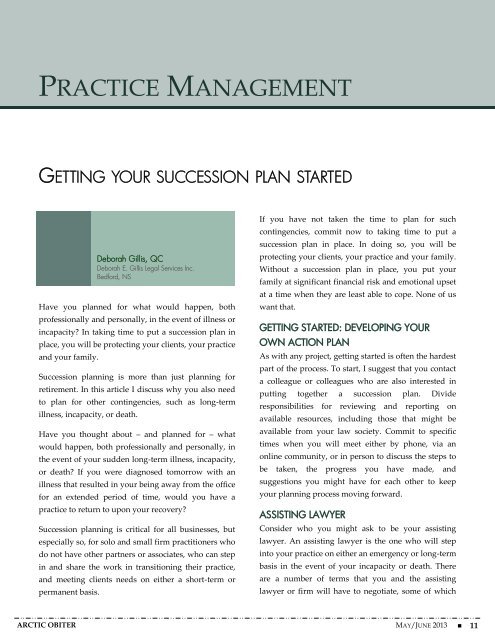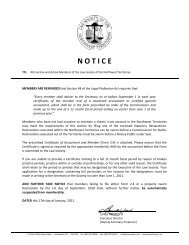PREPARED
Arctic Obiter - February 2010 - Law Society of the Northwest Territories
Arctic Obiter - February 2010 - Law Society of the Northwest Territories
You also want an ePaper? Increase the reach of your titles
YUMPU automatically turns print PDFs into web optimized ePapers that Google loves.
PRACTICE MANAGEMENT<br />
GETTING YOUR SUCCESSION PLAN STARTED<br />
Have you planned for what would happen, both<br />
professionally and personally, in the event of illness or<br />
incapacity? In taking time to put a succession plan in<br />
place, you will be protecting your clients, your practice<br />
and your family.<br />
Succession planning is more than just planning for<br />
retirement. In this article I discuss why you also need<br />
to plan for other contingencies, such as long-term<br />
illness, incapacity, or death.<br />
Have you thought about – and planned for – what<br />
would happen, both professionally and personally, in<br />
the event of your sudden long-term illness, incapacity,<br />
or death? If you were diagnosed tomorrow with an<br />
illness that resulted in your being away from the office<br />
for an extended period of time, would you have a<br />
practice to return to upon your recovery?<br />
Succession planning is critical for all businesses, but<br />
especially so, for solo and small firm practitioners who<br />
do not have other partners or associates, who can step<br />
in and share the work in transitioning their practice,<br />
and meeting clients needs on either a short-term or<br />
permanent basis.<br />
Deborah Gillis, QC<br />
Deborah E. Gillis Legal Services Inc.<br />
Bedford, NS<br />
If you have not taken the time to plan for such<br />
contingencies, commit now to taking time to put a<br />
succession plan in place. In doing so, you will be<br />
protecting your clients, your practice and your family.<br />
Without a succession plan in place, you put your<br />
family at significant financial risk and emotional upset<br />
at a time when they are least able to cope. None of us<br />
want that.<br />
GETTING STARTED: DEVELOPING YOUR<br />
OWN ACTION PLAN<br />
As with any project, getting started is often the hardest<br />
part of the process. To start, I suggest that you contact<br />
a colleague or colleagues who are also interested in<br />
putting together a succession plan. Divide<br />
responsibilities for reviewing and reporting on<br />
available resources, including those that might be<br />
available from your law society. Commit to specific<br />
times when you will meet either by phone, via an<br />
online community, or in person to discuss the steps to<br />
be taken, the progress you have made, and<br />
suggestions you might have for each other to keep<br />
your planning process moving forward.<br />
ASSISTING LAWYER<br />
Consider who you might ask to be your assisting<br />
lawyer. An assisting lawyer is the one who will step<br />
into your practice on either an emergency or long-term<br />
basis in the event of your incapacity or death. There<br />
are a number of terms that you and the assisting<br />
lawyer or firm will have to negotiate, some of which<br />
ARCTIC OBITER MAY/JUNE 2013 ■ 11
















